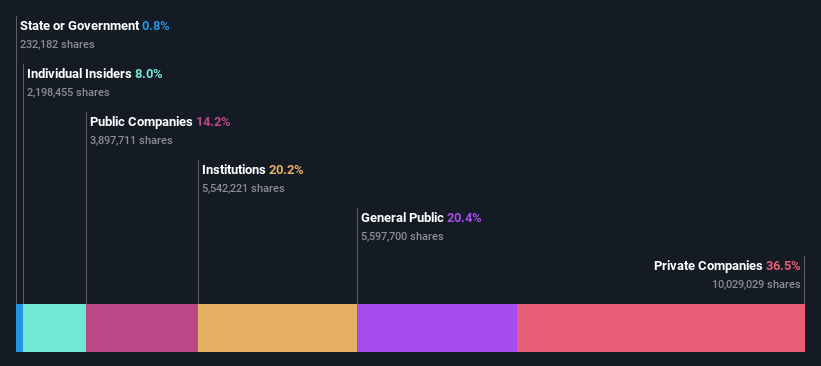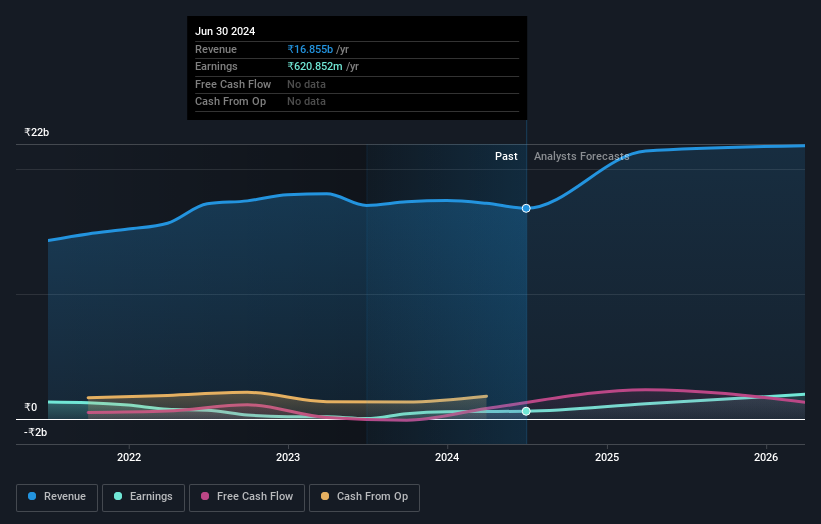- India
- /
- Basic Materials
- /
- NSEI:MANGLMCEM
Private companies among Mangalam Cement Limited's (NSE:MANGLMCEM) largest stockholders and were hit after last week's 11% price drop
Key Insights
- Mangalam Cement's significant private companies ownership suggests that the key decisions are influenced by shareholders from the larger public
- The top 8 shareholders own 52% of the company
- 20% of Mangalam Cement is held by Institutions
If you want to know who really controls Mangalam Cement Limited (NSE:MANGLMCEM), then you'll have to look at the makeup of its share registry. The group holding the most number of shares in the company, around 36% to be precise, is private companies. That is, the group stands to benefit the most if the stock rises (or lose the most if there is a downturn).
As market cap fell to ₹22b last week, private companies would have faced the highest losses than any other shareholder groups of the company.
Let's take a closer look to see what the different types of shareholders can tell us about Mangalam Cement.
View our latest analysis for Mangalam Cement

What Does The Institutional Ownership Tell Us About Mangalam Cement?
Institutional investors commonly compare their own returns to the returns of a commonly followed index. So they generally do consider buying larger companies that are included in the relevant benchmark index.
Mangalam Cement already has institutions on the share registry. Indeed, they own a respectable stake in the company. This can indicate that the company has a certain degree of credibility in the investment community. However, it is best to be wary of relying on the supposed validation that comes with institutional investors. They too, get it wrong sometimes. When multiple institutions own a stock, there's always a risk that they are in a 'crowded trade'. When such a trade goes wrong, multiple parties may compete to sell stock fast. This risk is higher in a company without a history of growth. You can see Mangalam Cement's historic earnings and revenue below, but keep in mind there's always more to the story.

Mangalam Cement is not owned by hedge funds. The company's largest shareholder is Vidula Consultancy Service Ltd, with ownership of 13%. The second and third largest shareholders are Rambara Trading Private Limited and Aditya Birla Real Estate Limited, with an equal amount of shares to their name at 8.7%.
On further inspection, we found that more than half the company's shares are owned by the top 8 shareholders, suggesting that the interests of the larger shareholders are balanced out to an extent by the smaller ones.
While it makes sense to study institutional ownership data for a company, it also makes sense to study analyst sentiments to know which way the wind is blowing. There is some analyst coverage of the stock, but it could still become more well known, with time.
Insider Ownership Of Mangalam Cement
The definition of company insiders can be subjective and does vary between jurisdictions. Our data reflects individual insiders, capturing board members at the very least. The company management answer to the board and the latter should represent the interests of shareholders. Notably, sometimes top-level managers are on the board themselves.
I generally consider insider ownership to be a good thing. However, on some occasions it makes it more difficult for other shareholders to hold the board accountable for decisions.
Our most recent data indicates that insiders own some shares in Mangalam Cement Limited. It has a market capitalization of just ₹22b, and insiders have ₹1.7b worth of shares, in their own names. Some would say this shows alignment of interests between shareholders and the board. But it might be worth checking if those insiders have been selling.
General Public Ownership
The general public-- including retail investors -- own 20% stake in the company, and hence can't easily be ignored. While this group can't necessarily call the shots, it can certainly have a real influence on how the company is run.
Private Company Ownership
It seems that Private Companies own 36%, of the Mangalam Cement stock. It might be worth looking deeper into this. If related parties, such as insiders, have an interest in one of these private companies, that should be disclosed in the annual report. Private companies may also have a strategic interest in the company.
Public Company Ownership
We can see that public companies hold 14% of the Mangalam Cement shares on issue. We can't be certain but it is quite possible this is a strategic stake. The businesses may be similar, or work together.
Next Steps:
It's always worth thinking about the different groups who own shares in a company. But to understand Mangalam Cement better, we need to consider many other factors. Case in point: We've spotted 2 warning signs for Mangalam Cement you should be aware of, and 1 of them is significant.
But ultimately it is the future, not the past, that will determine how well the owners of this business will do. Therefore we think it advisable to take a look at this free report showing whether analysts are predicting a brighter future.
NB: Figures in this article are calculated using data from the last twelve months, which refer to the 12-month period ending on the last date of the month the financial statement is dated. This may not be consistent with full year annual report figures.
New: Manage All Your Stock Portfolios in One Place
We've created the ultimate portfolio companion for stock investors, and it's free.
• Connect an unlimited number of Portfolios and see your total in one currency
• Be alerted to new Warning Signs or Risks via email or mobile
• Track the Fair Value of your stocks
Have feedback on this article? Concerned about the content? Get in touch with us directly. Alternatively, email editorial-team (at) simplywallst.com.
This article by Simply Wall St is general in nature. We provide commentary based on historical data and analyst forecasts only using an unbiased methodology and our articles are not intended to be financial advice. It does not constitute a recommendation to buy or sell any stock, and does not take account of your objectives, or your financial situation. We aim to bring you long-term focused analysis driven by fundamental data. Note that our analysis may not factor in the latest price-sensitive company announcements or qualitative material. Simply Wall St has no position in any stocks mentioned.
About NSEI:MANGLMCEM
Reasonable growth potential with adequate balance sheet.
Similar Companies
Market Insights
Community Narratives



